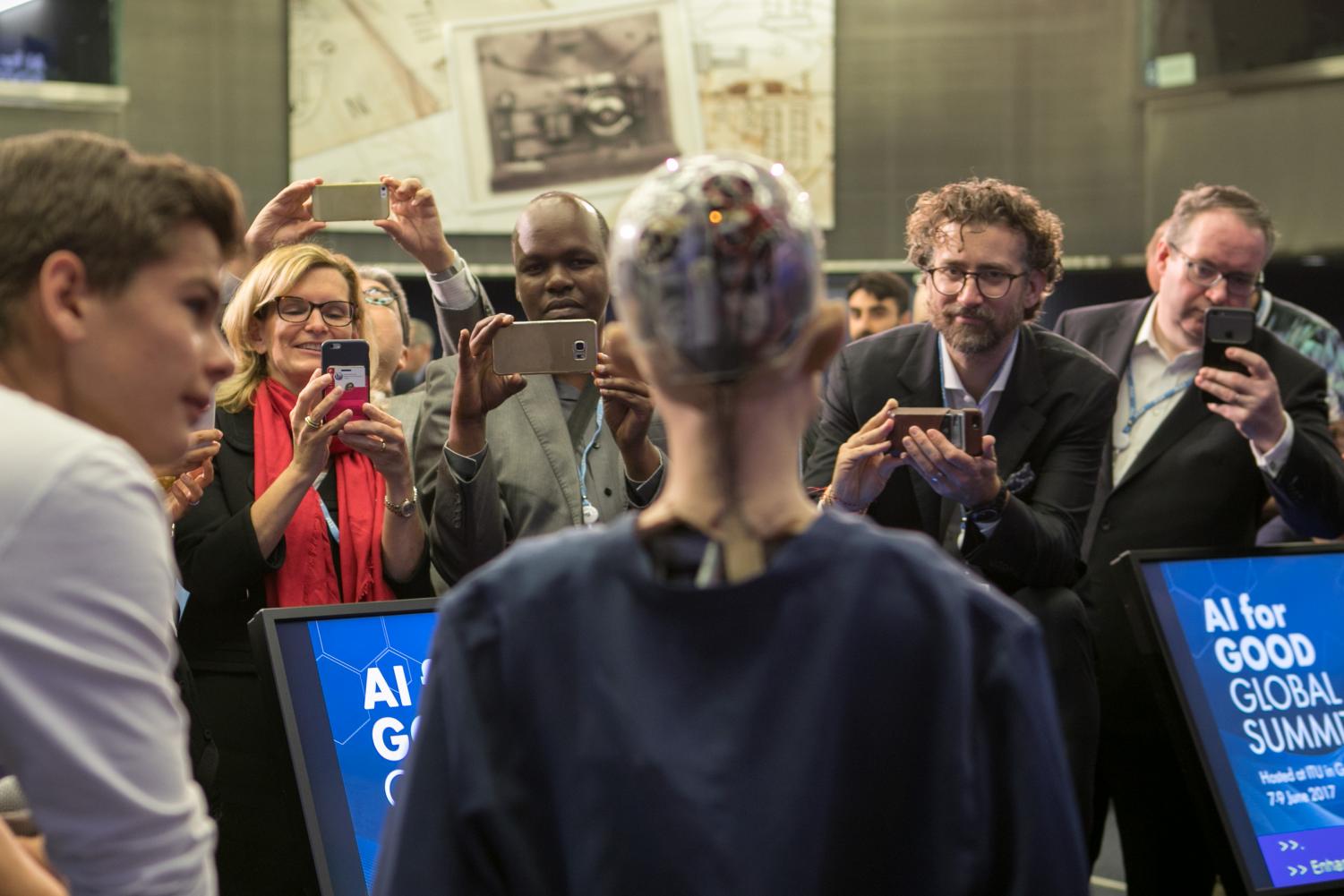Deep Dissection: Problems With Our Digital Future
November 26, 2018
Ever since our ancestors began using fire, tools have been essential to our success, elevating our accomplishments more and more as the tools themselves progress to increasingly complex levels. However, our intelligence has not experienced the same exponential growth that our technology has, leaving us behind in the dust trying to battle our technology addictions.
Our own creations derived to help us succeed may inevitably have only caused our capabilities to decrease over the generations, as we’ve become reliant. From calculators, to computers, mobile computers, and Artificial Intelligence, we have been able to do less and less independently as our machines take on more of the responsibility.
From my perspective, there are two main problems of our modern day society that make us comparatively more dependent on our technology than 20 or even 10 years prior. One of those major problems is the mass adoption of social media, with the other being our creation of competitive intelligence, or AI.
Social Media
First it would be easiest to describe the problem with social media, as the results of it are laid bare for us to see daily with our interactions with our smartphones. What used to be considered communication back before the age of the smartphone is now considered archaic. The technology now exists to link ourselves to our friends from across the state, country, and even the globe, but the connections we form with these friends appear to be weaker than ever. With these “through a window” interactions, we are less compelled to seek out face-to-face communication with the same people that we’ve been getting to know through a text or a Snap.
Why is this the case? There are a couple of main reasons that social media has the power to drive us apart, and they all have to do with human nature. Social media is derived to activate our sense of accomplishment, dopamine. A research paper published at Harvard.edu perfectly illustrates the chemical reactions produced by the social media, but it can be summed up like this:
Dopamine is our reward chemical that is often fired whenever we get an unexpected, positive stimuli, but we often replicate the stimuli and try to recreate the dopamine rush by engaging further in social media. This the trap that social media companies employ to keep us returning back to their services.

Phones, despite connecting us at greater distances, facilitate weaker communication experiences.
By facilitating small positive reactions through a “like” or a chat, social media companies keep us coming back to their products in hopes of receiving more of those likes and texts, even if the interactions fulfilled through these services are less authentic then actually holding an in-person conversation with your friend.
Social media also appeals to our human nature in terms of competitiveness and laziness. By seeing posts from people in your life hanging out with certain other people, going to parties and just having fun, there is a sense of competitiveness fostered, an internal monologue of “Well I’m going to hang out with X and have fun doing Y, to show that I’m just as social as my friend.”
Also the other aspect of human nature that is catered to by social media is laziness, since why would anyone actually go through the effort to go schedule a time to hangout, especially if your friend is far away, when you could just use an application like FaceTime or Snapchat to foster a less authentic, but a still communicative experience, over the phone?
Social media and the evolution of technology to the point of the smartphone have eradicated what use to be social customs, with us now being glued to our devices to facilitate constant but shallow interactions with those around us in trade for the depth of human face-to-face interaction that was the norm before this technology.
Artificial Intelligence (AI)
Now we should discuss how the evolution of technology has lead to competitive intelligence that may soon surpass our own: AI. This topic is very complicated, so bear with me as I try to explain it the best I can.
What used to be computing on a simple level like calculators, has now begun to solve all of our questions. Instead of looking through books for research assignments, students now just “Google” it, which may inhibit learning new material. This simple one step process lends itself to the 21st century argument of “Why will I need to know how to do this formula, or understand this information if I can just look up the answer?”
What’s worse than this argument sadly becoming valid due to the sheer power of the internet and basic computing, is it becoming nonessential for us to begin even asking the questions. Artificial Intelligence for the longest time has been relegated to voice assistants like Siri, Google Assistant, Alexa, waiting for our prompts to begin searching for the answers or operating our devices in the ways we ask, but assistants are becoming more and more proactive.
Some road maps for companies plan to have AI streamline all of the unconscious decisions from the day, but others plan to be especially more ambitious like Google’s DeepMind AI. The company’s goal is this:
“We’re on a scientific mission to push the boundaries of AI, developing programs that can learn to solve any complex problem without needing to be taught how.”-DeepMind Company
With the AI planned to be solving complex problems larger than what we are capable of at one time, it is very easy to realize that we have grown completely reliant on this type of large-scale computing. With these companies pursuing true AI, deep learning algorithms can help make even an automated voice assistant become the first machine to pass the long touted Turing Test.
Back at the Google I/O Conference in May of 2018, Alphabet announced that its service Google Assistant would eventually be able to make reservations through a division they’ve called Google Duplex. The assistant sounded like an actual person and even incorporated “ums” and natural sounding pauses to further imitate human speech. While this software is limited in capabilities at the moment, failing the Turing Test because of its limited scope, it’s undeniably a proof of the progression that AI has taken to become more indistinguishable from human intelligence. In the foreseeable future, it can be expanded to be more proactive and assume more human-like aliases.

Alphabet, the parent company of Google, collects massive amounts of data, allowing for next level artificial intelligence, like Google Assistant.
An example of animatronics resembling humans from the visual perspective is Sophia, a robot designed by Hanson Robotics, which is designed to replicate our conversational expressions and inflections. It’s a little stiff right now with many pre-programmed responses to questions, but combining the fidelity of something like the conversational speech and deeper contextual awareness of something like Alphabet’s Google Duplex and the facial expression engineering of Hanson Robotics’ Sophia, would lead to a major scientific and moral debate.
If it’s indistinguishable from a person, should we treat it as an individual person or our machine? Are then entitled to citizenship? Are they entitled to protections? Should we still rely on them for all of our computational and laborious needs? These are all the questions that we will have to face as we continue down this slippery road of making the AI more and more life-like.
Eventually on this path, we will have created pseudo-humans, far surpassing our capabilities, looking like us, sounding like us, but despite the robot becoming more and more complex, the purpose it was built for still remains the same: to work all of the mundane computational tasks other labor that we no longer want to do ourselves.
Putting aside the moral, political and scientific debates from this upcoming problem, our technological push into this sector is dangerous. No–not “Westworld” or “Detroit: Become Human” levels of dangerous. It isn’t feasible that they could rise against us (yet), but it is feasible that this competitive intelligence will make us truly dependent on our technology past the point of no return, asking instead of people to perform jobs or tasks, AI to perform those jobs.
We’ve relied on calculators, Google searches, laptops, cell phones, and digital assistants for long enough that we as a society may be lost when it comes to doing tasks that previous generations had ingrained into them.
Summation
The two main factors that have driven our society backwards in terms of individuality and self-reliability have been the game of degradation that social media plays with our dopamine responses and social communication abilities, and the rapid expansion of computational intelligence forcing us to think less as we rely on the tech more and more.
Unfortunately, there seems to be no exact solution to either of these problems, as tech companies pull forward steadfast into an AI-driven future, and social media conglomerates continue to rake in the cash from consumer engagement with their services and products. The best route of action is to independently pursue and learn on your own, so if ever need be, you can rely on your own intelligence instead of rely on the increasingly intelligent but fallible tech that we are continuing to create.
*Update: (11/26/18, 8:48pm) Fixed Formatting Issues with Image Captions and Site Accreditation*
*Update: (1/7/19, 5:33pm) Updated Title to Fit in with Deep Dissection Series

Elijah Dosda • Nov 28, 2018 at 11:50 am
Thank you for your constructive criticism, and I agree with your point. Tech also has a lot of benefits on society, but I was intending to highlight the negative consequences of technology in this article. I’m always looking to improve, so again thank you for your feedback!
-Elijah Dosda, The Vision Sports Editor
Aalyah Zion • Nov 27, 2018 at 5:27 pm
I see The Vision is taking new steps forward in the appearance of the articles. This is very appealing to the eye. This is also a good article; however, I don’t think you did a very good job of providing counter-claims. While there are many things wrong with our dependency on technology, as you explained, there are many good things about it, too. Other than that, great job! Keep up the good work.